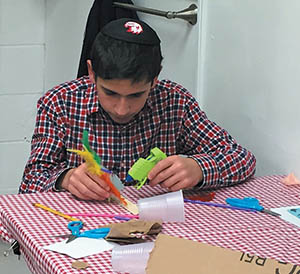





Parents are often astounded by their children’s technological abilities. Terms such as STEM (Science, Technology, Engineering and Math), PBL (Project-Based Learning), and the Maker movement are now commonplace among students and educators, but many parents lag behind.
On March 6, the I.D.E.A. Schools Network will present its first MakerXpo. Children and adults will get a taste of the Maker movement, which combines creativity with hands-on learning, and using technology to bring ideas to life. Doni Farkovits, director of technology at The Heschel School, and one of the event’s organizers, explains that “the Maker movement allows us to be active participants. Creating is what makes for successful adults, and the movement allows our kids to transition from consumers to creators.”
The MakerXpo is a collaborative event, planned by tri-state area schools and organizations including HAFTR, The Heschel School, Magen David Yeshivah, Ma’ayanot, PresenTense, The Schechter Day School Network, Yavneh Academy and Yeshivat Noam. Additional schools and organizations, including The Moriah School, RYNJ, SAR Academy MS, Solomon Schechter Day School of Manhattan, Strategic Hebrew, TABC, Teva, Visrael and the YU School Partnership are also running booths or contributing resources. Tikvah Wiener, chief academic officer at Magen David Yeshivah High School and co-founder and director of the I.D.E.A. Schools Network, says that the involved schools are “cross-denominational. It’s a nice way to gather the whole Jewish community.”
Booths will feature sense-oriented, high-tech, low-tech and artistic activities, showcasing the Expo’s theme, which is “Challenge Your Imagination.” Wiener believes that “school should be fun and learning should be joyful, so that kids want to do it.”
Ma’ayanot’s co-directors of STEAM education and innovation, Orly Nadler and Gila Stein, have elevated their STEAM (“A” for Art) elective to a core curriculum requirement beginning in September 2016. Nadler, who is also director of the technology department, believes “It’s a real literacy—being able to code and use technology. [We want our students] to create robotics and integrate technology toward solving real-world problems.” Some of their STEAM students will help design and run Ma’ayanot’s “Fail Forward” booth.
Their booth, according to Nadler, “[will] enlighten students as to how the mind works. We will present a challenge where [participants] try to get an LED to light up. [They may] go through many iterations for it to work.” Failing and trying again, says Nadler, “strengthens the mind’s ability to grow, making it easier to attempt challenges in the future. Brains can change, and that understanding can change [one’s] approach to life and failure. Failure is not a dead end—it’s a springboard.” Adds Stein, who is also head of the science department, “It’s the process of trying and failing that make multiple parts of your brain light up.” Their booth, says Wiener, “shows [kids] that while you figure it out, your brain is working. The struggle is the reward.”
Yavneh Academy, host of the MakerXpo, has been involved in the Maker movement for a number of years, and is a charter member of the I.D.E.A. Schools Network. Yavneh has a dedicated MakerSpace, which is available for students to use during their free time and to enhance the curriculum during class time. In this space, students “stretch their imagination while inventing and learning,” according to Chani Lichtiger, Yavneh’s educational technology director.
Lichtiger notes that “many teachers have begun to integrate the MakerSpace into their curriculum. [The students] are proud to exhibit and share their creations while they demonstrate their learning. Our booths for the expo will focus on different aspects of circuitry. [Some of our] students have taken a leadership role within our MakerSpace and will be facilitators for the day of the MakerXpo. Students recognize the importance of creativity and their unique perspective in their learning. As students invest in their own projects, they take greater control and interest in the material. They seek teachers for guidance, support and directions rather than a single correct answer.”
Wiener explains that “in school there is traditionally a right answer and a wrong answer, and a student’s job is to get the right answer. In STEM and PBL, the process of learning is the right answer.”
Benny Gross, director of educational technology at HAFTR, has integrated STEM into the pre-k through 12th grade curricula. For him, the “objective is not to focus on technology. Technology is the tool and gateway for the existing curriculum and for enhancing STEM values.” One of these values is logic—a critical skill whether creating an algorithm or learning Gemara. Gross developed the kindergarten curriculum so that students get a “logic-based understanding of the computer.” These skills are nurtured so when they reach older grades they can use logic to code, program, create with 3D printers and design robots.
According to Gross, Jewish educators must embrace STEM because “education is changing and we need to stay ahead of the game. [Educating our children] is what has made us survive all these years.” HAFTR students will be on hand at the MakerXpo, where, Gross says, “they will be the teachers.” One of the projects featured at their booth will be a piano made out of canvas. Gross proudly emphasizes that “the students programmed it so you can play it and it makes the sound. After the MakerXpo they plan to give the piano to a HAFTR student who uses a wheelchair since it is foldable and easy to carry.”
“All of the schools involved in the MakerXpo,” according to Wiener, “are committed to their STEM programs and/or developing MakerSpaces. [They] are playing a key role in transforming Jewish education. The MakerXpo gives us a chance to showcase the innovative work going on in Jewish schools and organizations all over the tri-state area. We have a lot to be proud of here.”
To register or learn more about the MakerXpo, visit http://makerxpo.org.
By Robin Tare










